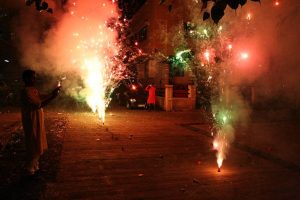We know Halloween as a day filled with spookiness and eerie masks, rooted in the ancient Celtic festival of Samhain. While many are familiar with Halloween’s celebration on October 31, a time when the veil between the living and the dead is believed to be at its thinnest, Bengalis have their own version of this tradition, celebrated a day before Kali Puja. We call it Bhoot Chaturdashi.
Bhoot Chaturdashi is a tradition that honors the ancestors of the past 14 generations. Like Halloween night, people believe that on this evening, the portal between the living and the dead opens, allowing ancestors to mingle with the living and offer blessings. However, they also believe it to be a time when when evil spirits may roam the earth freely.
To honor ancestors and ward off evil, households light 14 diyas to illuminate every corner of the home, with the belief that the light not only keeps away harmful spirits but also guides the ancestors. The light of the diya symbolizes protection, warmth, and spiritual cleansing, reinforcing the belief that light will always prevail over darkness.
In addition to lighting 14 diyas, families celebrate by sharing spooky stories and preparing a meal with 14 varieties of leafy greens, known as “14 saak,” thought to boost immunity and ward off illness. Unlike Halloween, however, Bhoot Chaturdashi does not feature children in costumes or trick-or-treating; instead, it emphasizes cleansing, purification, and honoring one’s ancestors.












